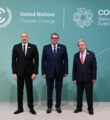Deadly Heat Waves to Increase by 2100, even with Emissions Reductions (Study)
Washington – Much of the world will face a significant rise in deadly heat waves by the end of the century, even if countries succeed in meeting their agreed-upon emission reduction goals, according to a new study.
Such heat events will be three to 10 times more common in 2100 than they are today in the U.S., Western Europe, China and Japan, regardless of efforts made to keep global warming below 2 degrees Celsius, said the study, published in Communications Earth & Environment on Thursday.
As part of the Paris climate agreement that was signed at the 2015 United Nations Climate Change Conference, participating countries agreed to adhere to this limit, with hopes of keeping the increase to an even smaller 1.5 degrees Celsius.
To improve their chance of success, each nation submitted its own climate action plan to cut greenhouse gas emissions.
The authors of the new study fear that these efforts will be insufficient to drive down heat.
“The record-breaking heat events of recent summers will become much more common in places like North America and Europe,” said lead author Lucas Vargas Zeppetello, a postdoctoral researcher at Harvard University.
Vargas Zeppetello and his colleagues evaluated projections for the future “heat index,” a combination of air temperature and humidity that measures the impact of heat on the human body.













